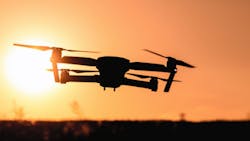PRO TIP: New Drone Program? Leveraging Certificates of Waiver or Authorization
The use of small unmanned aircraft systems (sUAS) has various benefits including mitigating risks, expanding the capabilities of manpower, and providing critical real-time information to key personnel when responding to any type of situation. That’s why so many law enforcement agencies across the country have already embraced these new capabilities and integrated sUAS operations as part of their repertoire.
The integration of sUAS technology is certainly a major undertaking for any organization but when done right becomes a valuable technological advantage to officers in the field. It is critical to ensure that any implementation effort is designed for success. Part of that success is ensuring your agency leverages key opportunities and streamlines processes available to law enforcement. One of those opportunities is access to the Certificate of Waiver or Authorization (COA) process with the Federal Aviation Administration (FAA).
Part 107 Waiver vs. Certificate of Waiver or Authorization
A Part 107 waiver gives permission for an operation to deviate from a specific provision within Part 107 and to operate a sUAS in the specific manner for which the waiver is applied. Most commonly, Part 107 waivers are requested for permission to fly at night or over people; and less common but still an option to operate multiple sUAS at one time or at altitudes greater than 400 feet above ground level (AGL). It is important to note that a Part 107 waiver is required for each regulatory provision where a deviation is desired and generally, these waivers are advantageous when the deviation is part of a straightforward, simpler operation.
When specific deviations are more integral to the operation or are a layer of a more complex operational makeup and expected to occur regularly, meaning you will be applying for many waivers, a Certificate of Waiver or Authorization can be a more helpful, streamlined solution. A Certificate of Waiver or Authorization (COA) is issued by the FAA for Public Aircraft Operations permitting a specific unmanned aircraft activity. As qualifying governmental organizations, law enforcement agencies are uniquely positioned to take advantage of this option. The fundamental difference being that COAs consider and approve the entire operation where operations at night and over people, as an example, are part of the application and approved in one, singular package.
How do I get one?
Why invest in a COA?
Efficiency. Is your agency operating with less money and fewer people? Think about choosing between applying for many Part 107 waivers over a given period of time and applying for a single COA. Considering all the variables the COA route is likely the more efficient, cost-effective option. Invest the time and manpower to thorough completion of the application once and upon approval have a green light for your entire ongoing operation, not just pieces and parts.
COAs can be used to create the framework for a drone program’s long-term viability. Through contingency planning and foresight your agency has identified public safety scenarios and probabilities for the future. Explore the ways Blanket Area Public Safety COAs and Jurisdictional COAs can lend themselves to your agency doing what it does best. Think beyond what you are doing today and think about what you could do, or may need to do, tomorrow.
The regulatory landscape is constantly evolving. Every single safe sUAS operation strengthens the validity of this growing technology. Every one of those in a law enforcement application pushes the envelope of what is possible while building the public’s trust in how law enforcement can use drones for the greater good. Do you see a void? A place where using an sUAS would improve officer safety, positively contribute to public safety, save lives, save money? Use a COA as a platform for law enforcement personnel to provide strategic and collaborative input, directly to the FAA, for the safe and efficient use of sUAS. Make a case for doing it the right way and push the envelope of what is possible which helps shape the regulations of the future.
Not an sUAS expert?
Of course not! You’re a law enforcement expert and you’ve spent countless hours of your life, blood, sweat and tears perfecting your craft. The same is true in aviation. There are aviation and drone experts who have spent as much time and money becoming experts in their field. They’ve mastered the regulatory environment, are seasoned pros when it comes to navigating the complex web of aviation regulations, and can evaluate sUAS programs to determine what type of COAs would be beneficial to your agency and circumstances.
Leveraging an expert can allow personnel to engage their vast experience and understanding of enforcement needs without spending excess valuable time. Furthermore, they can assess budget constraints and ensure a timely and cost-effective process as spending is constantly under scrutiny. Each innovative organization has the ability to drive this technology forward in a faster and more efficient way and ensure that everything has been done to get in front of the next public safety threat. An expert can quickly and effectively step into an organization, understand its goals and budget with a sUAS initiative, and help optimize the operations and funds available to ensure the short and long-term success of a new system.
sUAS is the next advancement and member of the police force. Staying ahead of these advancements by seeking expert experience and COAs can provide your organization with a strategic advantage to manage costs, mitigate risks, and continue to protect your communities.
